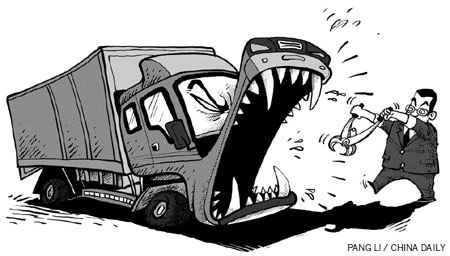
There are deaths caused by natural disasters or an unavoidable combination of events, and there are deaths that result from negligence, lack of control and direct responsibility of a group of individuals. The second type of deaths can be prevented or, at least mitigated. The deaths caused by traffic accidents in China belong to the second category.
Every year, about 65,000 people die on China's roads, but depending on how statistics are computed, this figure may even be as high as 200,000. Although the number of deaths has declined in the last couple of years, it is still high both in relative and absolute terms.
In absolute terms, road accidents in China claim roughly as many victims each year as the confirmed death toll in the 2008 Sichuan earthquake. The quake death toll was largely because of natural, almost unavoidable causes. The deaths on the roads, however, are a shame for the country and for those who are responsible for them.
During a recent trip to Zhuhai, Guangdong province, I took a taxi from the train station to the city center, more than 20 km away. The taxi driver who ran past red lights at almost 100 km an hour explained that many cabbies in Zhuhai break traffic rules in order to maximize their earnings per hour because "living expenses are higher here than elsewhere, even more than Shenzhen". In Shenzhen, "taxi drivers don't need to drive so fast". Of course, there were no police cars, or functioning video cameras along the route we took in Zhuhai.
Roads in China have become unsafe, because of the breakneck pace of economic development, which has been faster than the time people need to adapt to. Road accidents are mainly caused by (just to name a few) driver's disregard for traffic laws, reckless driving, lack of driving skill, widespread anxiety to reach their destinations as quickly as possible, driving while smoking, driving while talking on the phone and disregard for seatbelts, as well as city planning with extensive wide and long road stretches that encourage speeding.
Laws and regulations are generally adequate - except the incomprehensible freedom to take the right turn even when the traffic light is red. The problem is that many drivers do not respect the laws and regulations. Besides, they are not enforced properly.
Although I know it will be impossible but I can't help imagining that perhaps drivers should be stopped from driving (except for emergencies and other necessary services) for a whole week, and made to attend a serious program on road safety, switching from training for accident prevention and safe driving to education on severe penalties for traffic rule breakers. At the end of the week, everyone should be made to retake road tests. Drivers who pass the tests should be re-issued new licenses, and those who fail should have their licenses cancelled and be barred from driving.
If this is done, the average quality of driving would rise significantly, and there would be fewer cars on the roads, less pollution, and of course fewer accidents.
Another, and perhaps more practical, solution is to install GPS/speed monitoring systems in all vehicles, public and private. Vehicles offering public services - such as school buses, long- and short- distance buses, and trucks - should be put under special monitoring, and automatic fines should be levied on those who break traffic rules. There should be harsh penalties for dangerous driving and repeated traffic offenses. And driving licenses of traffic rule violators should be cancelled and their vehicles confiscated with little mercy.
People may not understand such strict rules in the beginning, but they will realize their importance with the passage of time.
As one of the fastest growing countries in the world, China can allocate more resources to prevent road accidents. The level of development of a country is not measured by the number of spacecraft it sends into space or the length of the highway network it has. Instead, it is measured by the level of education of citizens and respect they have for the others. Above all, it is measured by how much respect its citizens have for others' lives. The authorities can surely do more to prevent nearly 300 people from dying on the roads every day.
The author is head of China Program at the Global Policy Institute of London Metropolitan University and senior research fellow at Zhejiang University.
(China Daily 12/27/2011 page9)